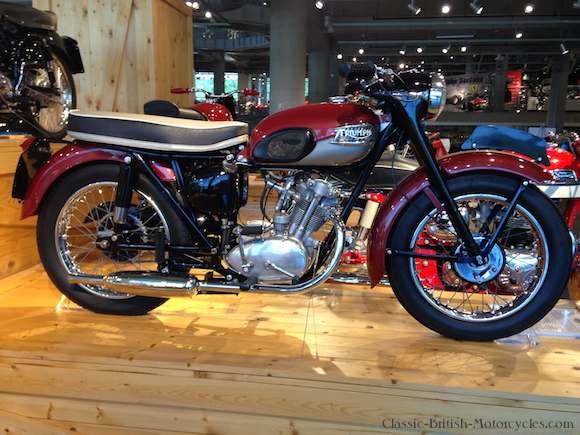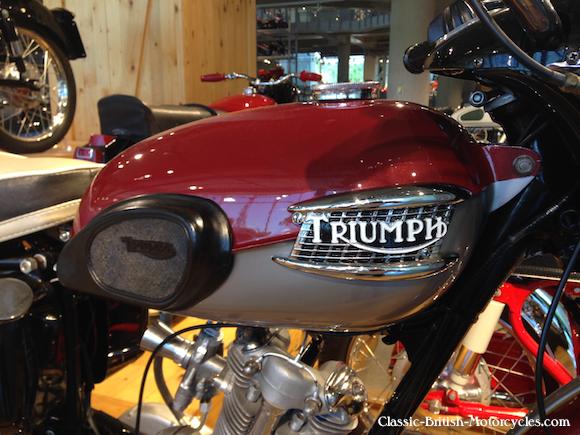1959 Triumph Tiger Cub
1959 TRIUMPH TIGER CUB BACKGROUND
The 200cc T20 Tiger Cub was produced from 1956 through 1968 and sold quite well for Triumph. The original Cub was introduced in 1953 at the Earls Court Motorcycle Show in London England as a 150cc commuter, at a time when there was a very big market for commuters. However, the Cub was designed specifically, and cleverly, to fill a very specific part of that growing market. England was about to pass the “Learner Law” requiring all motorcycle riders under the age of 18 could not ride anything larger than a 250. This created a boom in the bottom of the market. Parent-company BSA had their own 125 Bantam 2-stroke, and the C25 250 4-stroke single. So, Triumph launched the Tiger Cub as a 150, sort of splitting the difference.

1959 TRIUMPH TIGER CUB STYLING
They also made it smaller, sort of a scaled-down Bonneville. And that wasn’t by accident. Legendary Triumph designer and stylist Edward Turner personally designed and styled the Tiger Cub, and it shows. This was a big part of the appeal that helped to make the Tiger Cub such a hit, certainly in the UK home market. Not so much in the US, who had no such learner law. But they still made it across the pond, and sold reasonably well in the US, where there were street versions that looked like miniature Bonnevilles, commuters that resembled Triumph’s ‘Bathtub Bikes’, and semi-off road versions that looked like a TR6. The good looks helped a lot, but their reduced size either helped or hindered sales. Being smaller, with one of the lowest seat heights on the market, they appealed to the younger riders the Triumph Tiger Cub was designed for. But, they held less appeal for full-sized, and/or more experienced riders. There’s no disputing that the Tiger Cub is a great-looking machine.



1959 TRIUMPH TIGER CUB “BATHTUB BIKE”
Enclosing or partially enclosing motorcycles was all the rage in the late-50s in England. Because the whether was so bad, and many motorcycles in England were used as sole transportation, this was intended to make the bikes easier to wipe down after a ride. However, moisture found its way into these (usually) sheetmetal enclosures and wreaked havoc from within. Triumph had styled both its 3T 350 twin (called the Twenty One) and 5T 500 Speed Twin in this manner and they immediately gained the nickname “Bathtub Bikes” with the public. They applied the same styling treatment to the 200 Tiger Cub. The added weight certainly didn’t help the already meager performance.
1959 Triumph Tiger Cub SPECIFICATIONS
|
Model designation Years in production Engine type Displacement Bore & Stroke Compression ratio Fuel system Lubrication system Engine output Primary drive Clutch Gearbox Final drive Frame type Suspension, front Suspension, rear Brake, front Brake, rear Tire, front Tire, rear Wheelbase Fuel capacity Weight, dry Top speed |
1959 Triumph Tiger Cub 200 1956-1968 Air-cooled OHV single-cylinder 4-stroke 199cc / 12.1 ci 63mm X 64mm 7.0:1 1- Amal carburetor Dry sump w/remote oil tank 14 hp @ 6500 rpm Chain Multi-plate, wet 4-speed constant-mesh, right-foot shift Chain Steel, single top & front tube, full cradle Telescopic fork, hydraulic damping Swing arm w/2 shocks (dampers) 5.5-inch SLS drum 5.5-inch SLS drum 3.00″ X 17″ 3.00″ X 17″ 1245mm / 49″ 3.6 US gal / 3.0 Imp gal / 13.6 L 95 kg / 210 lbs 97 kmh / 60 mph |



No Comment